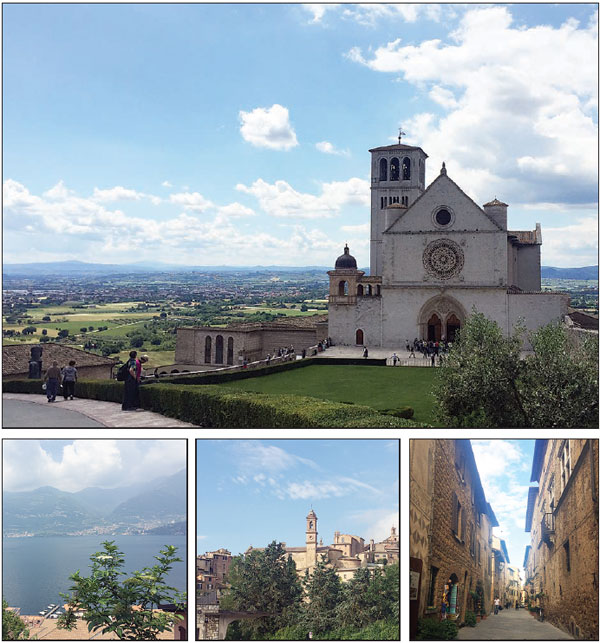Where virtue can even stop the barking
Updated: 2015-10-03 08:09
By Wang Shanshan(China Daily)
|
||||||||
In the land of St Francis of Assisi, warnings to watch for thieves disappear in a lake of kindness
As we entered the restaurant, a tall, lean man sat upright at one of the tables. On it were about five wine glasses, all half full.
"You should try the wine here," he called to us, before we had time to sit at a nearby table. "They've got some rare choices."
|
Clockwise from top: Cathedral Basilica of St Francis of Assisi; Montepulciano in Tuscany; Pienza; Lake Como. Photos by Wang Shanshan / China Daily |
He turned out to be a university professor from the United States who was on a trip to teach in Italy.
We were in Assisi, a town built on the slopes of a hill in the Umbria region in the country's north. On learning that we were from Beijing the professor, in his 70s, said he travels there every summer, and I half expected that next he would say, "How about meeting for a coffee next time I am there?" but the invitation never came.
Instead a lady walked in and sat at another table. This woman was impressive. She was at least 60, wore a sleeveless shirt and a smart pair of trousers and sat with a perfectly straight back. Her hair was all white, and beauty radiated from her.
As seemed to be the American's wont, he immediately said hello to the new stranger in his midst and began to engage her in conversation. She was a local and lived in a summer house in the mountain town, she told him. "I don't drive. They revoked my license several years ago because of my age."
That conversation continued happily, the American having dropped my girlfriend and I like hot potatoes. As for the Italian woman, I thought, what elan to be able to outdo us in the charm stakes, two women half her age.
On a five-day Italian jaunt, Umbria was our first stop. We had arrived in the country by sea, and caught a train from Ancona, on the Adriatic coast, to Assisi, about 130 kilometers away.
They say the sleepy town is not much different today to when St. Francis was born there near the end of the 12th century. The Franciscan order was founded there in homage to Francis, who would later become the patron saint of animals, in 1208.
We visited his tomb in the basement of the Basilica of San Francesco, where there was a respectful silence among the few dozen visitors who waited in line to get a close glimpse of the tomb. Suddenly one of those lined up withdrew from the line and dropped to his knees, kneeling before one of the altars. Although my friends and I are not religious, the air of veneration that we experienced during this visit was moving.
So moving that when we eventually went outside into the daylight, I took what the pilgrims inside might have regarded as a step of faith. Before we had set off on our trip, many people had warned us about thieves in Italy, so no sooner were we on Italian soil than I set the digital combination lock on my phone to protect it in the case of loss or theft.
It now occurred to me that in a place as peaceable as this there was nothing to fear, so I turned the lock off.
My feeling of serene reassurance deepened when we arrived in Perugia, the capital of Umbria, about 30 kilometers to the west.
Perugia is spread across a hilltop and surrounding valleys, which means it can be strenuous negotiating some of its steep streets. As we were passing a grocery, an elderly lady approached us and asked if we could help her carry a heavy bag to her house. We happily obliged, and she was kind enough to invite her into her home, which we politely declined.
Later we had dinner in a restaurant in an atmospheric basement setting, and after wining and dining left to go to our hotel As we walked along the dark street we realized someone was calling out to us from behind. It turned out that in the restaurant I had left my bag, which had my passport and wallet in it. Other diners noticed the bag, and the waiter was good enough to run after us to catch us.
Perugia is one of Italy's artistic centers and was hometown to many famous artists, and Raphael learned art here. We were bowled over by the numerous small shops selling locally designed fashion goods and extremely reasonable prices, my friend seeing the city as "a much better version" of 798 Art Zone in Beijing.
Walls five meters wide at least surround the city, and parts of them are hollow. Following a set of stairs, we came across an exhibition inside the walls showing the city's past as well as several photography and art studios. Underlining how much respect Perugia has for art and for artists, the studios are available for use free of charge for artistic use to anyone as long as they book in advance.
We would soon find out that in some cases booking in advance is not an automatic ticket to safe and happy travel. After Perugia, our next two destinations were two hilltop towns, Pienza, about 80 kilometers to the west, and Montepulciano, about 13 kilometers to Pienza's east, both in Tuscany. We bought the bus ticket for Perugia and were told our bus should leave at 2:10 pm. When we got to the bus terminal, imagine how surprised we were to find 20 buses in two lines - every single one of them due to leave at the same time. Yes, 2:10 pm.
Then began the frantic task of asking each driver - and we speak no Italian - if that particular bus was ours. But before we could complete the mission it was 2:10 pm. As if obeying the drill call of a sergeant major, all 20 buses pulled out of their parking bays in unison and in quick procession made for the exit. My friend and I stood there forlornly surveying the empty terminal.
That had been the last bus of the day heading for our destination, so we were left with no choice but to go by taxi. After an enjoyable 50-minute drive across rice fields that cost us an arm and a leg we were finally in Tuscany.
Pienza has been called the "touchstone of Renaissance urbanism", and if you have seen the movie Twilight you may recognize Montepulciano, a beautiful town that the vampire family in the film chooses as its retreat.
We stayed in Pienza for two nights. The town's dark yellow buildings are set against a backdrop of verdant rice fields that bask in the Tuscan sun. When night came, fireflies dotted the sky of the hilltop town.
Pope Pius II, a Renaissance humanist, is said to have been the mastermind behind Pienza, his ideal Renaissance town. He was born in the village that later became Pienza, and when he became Pope he had the village rebuilt as the first practical example of Renaissance urban planning.
A bus at the entrance to Pienza links a dozen hilltop towns in the region, among them Montepulciano, a 40-minute ride away. I had just enough wine there to be happily tipsy, which seemed an appropriate way to salute Italy's best grape, Montepulciano.
The bus went all the way north to the town of Siena, from where we took the train to Lake Como on the Italian-Swiss border. We had booked a room with a lake view at what was called a resort on the website where we booked it.
From the town of Como we took a one-hour bus into the hills where the owner of the place picked us up and drove us in his truck to the so-called resort, which turned out to be the family's summer home perched on the top of a hill. I and my two friends would have the place to ourselves.
As idyllic and secluded as the location was, it was also inhibiting, because there was no lighting on a footpath that passed through woods to the house so it was essential for us to be back in the house each day before sunset, about 8pm??. We pre-paid for three nights, and found we had little do in the evenings apart from chatting among ourselves and reading. I had just one book with me, the Lonely Planet guide for Croatia, and was able to read the complete book - several days after having visited the country. There is, as they say, nothing like hindsight.
One morning, I and one of my friends decided to go out exploring in the woods, and after about five minutes we were confronted by a dog about 100 meters away from us. This dog was huge, looking to be as tall as me, and menacing.
Terrified, we spun around and made a dash for it, with the yelping dog in hot pursuit. If there had been a gold medal to be won that morning, my friend would have won it because he managed to overtake me. Eventually the dog relented, and we got back to the house safe. Who knows? Perhaps the pilgrims of Assisi would say the patron saint of animals was looking over me that day.
We were soon back to the humdrum of Beijing, and after two weeks traipsing around three countries I began to feel that, for all the risks, there really is something alluring about the unpredictability of life on the road.
wangshanshan@chinadaily.com.cn
(China Daily 10/03/2015 page3)
- Senior US envoy to visit Japan, S Korea, China
- Russia, US agree to cooperate in solving Syria crisis: Russian FM
- Iranian President calls Iran deal victory over war
- LatAm experts praise Xi on yuan, globalization
- Evidence found of summertime water flows on Mars: study
- Dogs surf in contest in California
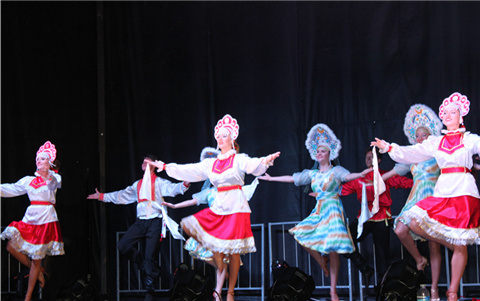
 Across Canada (Oct 2)
Across Canada (Oct 2)
 Ten highlights from Xi's trip to US and UN
Ten highlights from Xi's trip to US and UN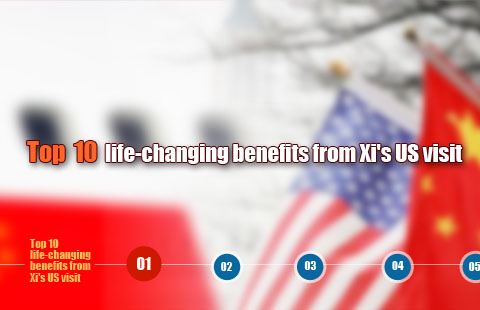
 Top 10 life-changing benefits from Xi's US visit
Top 10 life-changing benefits from Xi's US visit-
 Highlights of President Xi's speeches at UN
Highlights of President Xi's speeches at UN -
 The president's historic journey to the west
The president's historic journey to the west -
 China's first lady visits Juilliard School
China's first lady visits Juilliard School 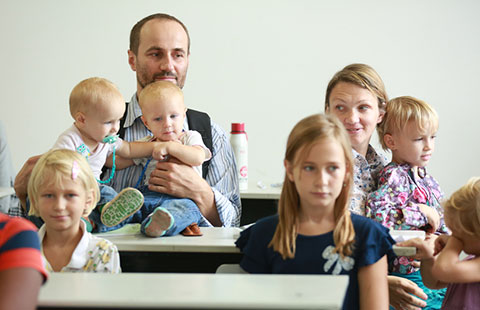
 Polish couple brings six daughters to China to study Chinese
Polish couple brings six daughters to China to study Chinese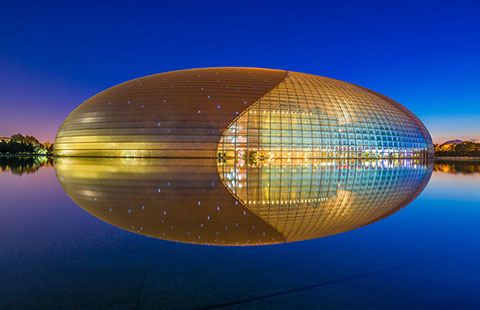
 Top 10 nominated designs at Beijing Design Week
Top 10 nominated designs at Beijing Design Week
Most Viewed
Editor's Picks

|

|

|

|

|

|
Today's Top News
Xi pledges $2 billion to help developing countries
Young people from US look forward to Xi's state visit: Survey
US to accept more refugees than planned
Li calls on State-owned firms to tap more global markets
Apple's iOS App Store suffers first major attack
Japan enacts new security laws to overturn postwar pacifism
Court catalogs schools' violent crimes
'Beauty of Beijing's alleys akin to a wise, old person'
US Weekly

|

|
